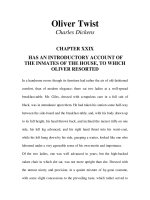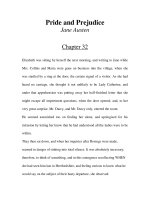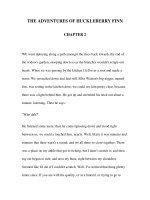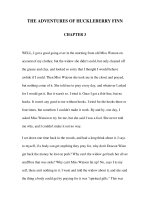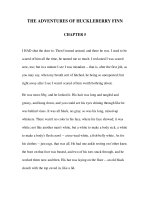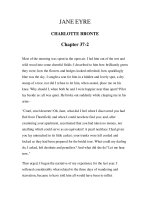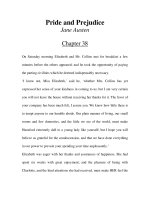Tài liệu LUYỆN ĐỌC TIẾNG ANH QUA TÁC PHẨM VĂN HỌC-SHORT STORY BY O’HENRY- A Chaparral Prince pptx
Bạn đang xem bản rút gọn của tài liệu. Xem và tải ngay bản đầy đủ của tài liệu tại đây (966.48 KB, 14 trang )
SHORT STORY BY O’HENRY
A Chaparral Prince
Nine o'clock at last, and the drudging toil of the day was ended. Lena
climbed to her room in the third half-story of the Quarrymen's Hotel. Since
daylight she had slaved, doing the work of a full-grown woman, scrubbing
the floors, washing the heavy ironstone plates and cups, making the beds,
and supplying the insatiate demands for wood and water in that turbulent
and depressing hostelry.
The din of the day's quarrying was over--the blasting and drilling, the
creaking of the great cranes, the shouts of the foremen, the backing and
shifting of the flat-cars hauling the heavy blocks of limestone. Down in the
hotel office three or four of the labourers were growling and swearing over a
belated game of checkers. Heavy odours of stewed meat, hot grease, and
cheap coffee hung like a depressing fog about the house.
Lena lit the stump of a candle and sat limply upon her wooden chair. She
was eleven years old, thin and ill-nourished. Her back and limbs were sore
and aching. But the ache in her heart made the biggest trouble. The last
straw had been added to the burden upon her small shoulders. They had
taken away Grimm. Always at night, however tired she might be, she had
turned to Grimm for comfort and hope. Each time had Grimm whispered to
her that the prince or the fairy would come and deliver her out of the wicked
enchantment. Every night she had taken fresh courage and strength from
Grimm.
To whatever tale she read she found an analogy in her own condition. The
woodcutter's lost child, the unhappy goose girl, the persecuted stepdaughter,
the little maiden imprisoned in the witch's hut--all these were but transparent
disguises for Lena, the overworked kitchenmaid in the Quarrymen's Hotel.
And always when the extremity was direst came the good fairy or the gallant
prince to the rescue.
So, here in the ogre's castle, enslaved by a wicked spell, Lena had leaned
upon Grimm and waited, longing for the powers of goodness to prevail. But
on the day before Mrs. Maloney had found the book in her room and had
carried it away, declaring sharply that it would not do for servants to read at
night; they lost sleep and did not work briskly the next day. Can one only
eleven years old, living away from one's mamma, and never having any time
to play, live entirely deprived of Grimm? Just try it once and you will see
what a difficult thing it is.
Lena's home was in Texas, away up among the little mountains on the
Pedernales River, in a little town called Fredericksburg. They are all German
people who live in Fredericksburg. Of evenings they sit at little tables along
the sidewalk and drink beer and play pinochle and scat. They are very thrifty
people.
Thriftiest among them was Peter Hildesmuller, Lena's father. And that is
why Lena was sent to work in the hotel at the quarries, thirty miles away.
She earned three dollars every week there, and Peter added her wages to his
well-guarded store. Peter had an ambition to become as rich as his
neighbour, Hugo Heffelbauer, who smoked a meerschaum pipe three feet
long and had wiener schnitzel and hassenpfeffer for dinner every day in the
week. And now Lena was quite old enough to work and assist in the
accumulation of riches. But conjecture, if you can, what it means to be
sentenced at eleven years of age from a home in the pleasant little Rhine
village to hard labour in the ogre's castle, where you must fly to serve the
ogres, while they devour cattle and sheep, growling fiercely as they stamp
white limestone dust from their great shoes for you to sweep and scour with
your weak, aching fingers. And then--to have Grimm taken away from you!
Lena raised the lid of an old empty case that had once contained canned corn
and got out a sheet of paper and a piece of pencil. She was going to write a
letter to her mamma. Tommy Ryan was going to post it for her at
Ballinger's. Tommy was seventeen, worked in the quarries, went home to
Ballinger's every night, and was now waiting in the shadows under Lena's
window for her to throw the letter out to him. That was the only way she
could send a letter to Fredericksburg. Mrs. Maloney did not like for her to
write letters.
The stump of the candle was burning low, so Lena hastily bit the wood from
around the lead of her pencil and began. This is the letter she wrote:
Dearest Mamma:--I want so much to see you. And Gretel and Claus and
Heinrich and little Adolf. I am so tired. I want to see you. To-day I was
slapped by Mrs. Maloney and had no supper. I could not bring in enough
wood, for my hand hurt. She took my book yesterday. I mean "Grimm's
Fairy Tales," which Uncle Leo gave me. It did not hurt any one for me to
read the book. I try to work as well as I can, but there is so much to do. I
read only a little bit every night. Dear mamma, I shall tell you what I am
going to do. Unless you send for me to-morrow to bring me home I shall go
to a deep place I know in the river and drown. It is wicked to drown, I
suppose, but I wanted to see you, and there is no one else. I am very tired,
and Tommy is waiting for the letter. You will excuse me, mamma, if I do it.
Your respectful and loving daughter,
Lena.
Tommy was still waiting faithfully when the letter was concluded, and when
Lena dropped it out she saw him pick it up and start up the steep hillside.
Without undressing she blew out the candle and curled herself upon the
mattress on the floor.
At 10:30 o'clock old man Ballinger came out of his house in his stocking
feet and leaned over the gate, smoking his pipe. He looked down the big
road, white in the moonshine, and rubbed one ankle with the toe of his other
foot. It was time for the Fredericksburg mail to come pattering up the road.
Old man Ballinger had waited only a few minutes when he heard the lively
hoofbeats of Fritz's team of little black mules, and very soon afterward his
covered spring wagon stood in front of the gate. Fritz's big spectacles
flashed in the moonlight and his tremendous voice shouted a greeting to the
postmaster of Ballinger's. The mail-carrier jumped out and took the bridles
from the mules, for he always fed them oats at Ballinger's.
While the mules were eating from their feed bags old man Ballinger brought
out the mail sack and threw it into the wagon.
Fritz Bergmann was a man of three sentiments--or to be more accurate--
four, the pair of mules deserving to be reckoned individually. Those mules
were the chief interest and joy of his existence. Next came the Emperor of
Germany and Lena Hildesmuller.
"Tell me," said Fritz, when he was ready to start, "contains the sack a letter
to Frau Hildesmuller from the little Lena at the quarries? One came in the
last mail to say that she is a little sick, already. Her mamma is very anxious
to hear again."
"Yes," said old man Ballinger, "thar's a letter for Mrs. Helterskelter, or some
sich name. Tommy Ryan brung it over when he come. Her little gal workin'
over thar, you say?"
"In the hotel," shouted Fritz, as he gathered up the lines; "eleven years old
and not bigger as a frankfurter. The close-fist of a Peter Hildesmuller!--some
day I shall with a big club pound that man's dummkopf--all in and out the
town. Perhaps in this letter Lena will say that she is yet feeling better. So,
her mamma will be glad. Auf wiedersehen, Herr Ballinger--your feets will
take cold out in the night air."
"So long, Fritzy," said old man Ballinger. "You got a nice cool night for
your drive."
Up the road went the little black mules at their steady trot, while Fritz

